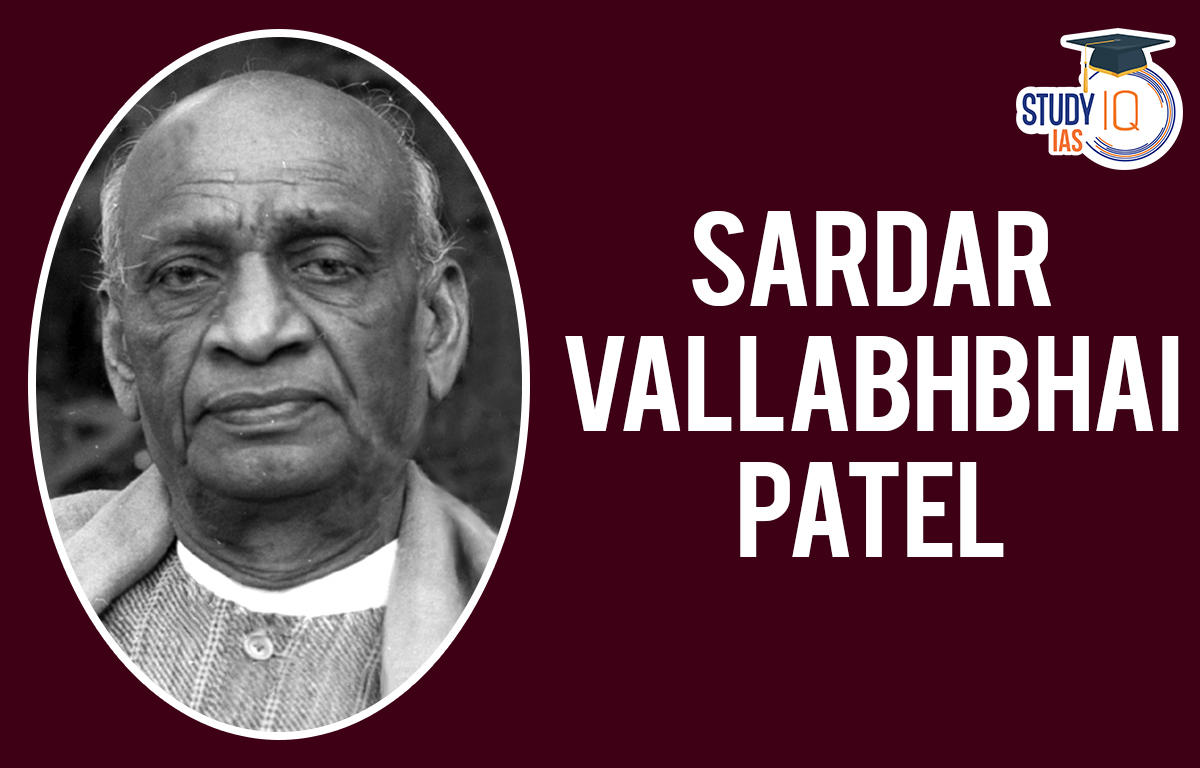Table of Contents
Sardar Vallabhbhai Patel
Sardar Vallabhbhai Patel was an Indian leader, lawyer, and freedom fighter who was instrumental in bringing princely states into the Indian Union and in the campaign for India’s independence. He is often referred to as the “Iron Man of India” due to his tenacious leadership and unifying influence on the history of the nation.
Sardar Vallabhbhai Patel Early Life & Education
On October 31, 1875, in Nadiad, a small town in Gujarat, India’s Kheda district, Sardar Vallabhbhai Patel was born. He was Jhaverbhai Patel and Ladbai’s fourth child. His mother was a devoutly religious woman who had a big impact on Patel’s upbringing. His father was a farmer and a part-time local official. Patel finished his primary schooling at a school in the nearby village of Karamsad. He moved to Ahmedabad after finishing high school to study at Gujarat College, where he did exceptionally well. Patel relocated to England in 1900 to pursue a legal education at London’s Middle Temple Inn. He returned to India to practise law after being admitted to the bar in 1910.
Sardar Vallabhbhai Patel & Freedom Struggle
Sardar Vallabhbhai Patel played a significant part in the fight for India’s independence since he was always connected to the Indian National Congress. He was moved by Mahatma Gandhi’s nonviolent ideology and became a devoted adherent. Patel joined the Kheda Satyagraha in 1917 to oppose the British government’s oppressive taxation practices. This action was led by Mahatma Gandhi. Patel was important in organising the Satyagraha movement and in helping to negotiate a deal with the British government. Patel was chosen to serve as the Gujarat Pradesh Congress Committee’s Secretary in 1920. He was instrumental in the Mahatma Gandhi-led Non Cooperation Movement that was started in 1920. Patel spent several years in prison after being detained numerous times for his participation in the independence struggle.
Sardar Vallabhbhai Patel & Indian National Congress
Patel was selected to lead the Indian National Congress in 1930. He was a key organiser of the Salt Satyagraha, a national movement that challenged the British government’s control over salt production. Together with other leaders, Patel was detained and imprisoned. After being released from prison in 1931, Patel received an invitation to the Second Round Table Conference in London. He was one of the few Indian politicians present at the meeting, which was held to talk about India’s future political direction. Patel returned to India after the meeting and kept up his strong participation in the fight for freedom. He played a crucial role in setting up Mahatma Gandhi’s 1942 Quit India Movement. Patel was taken into custody once more and imprisoned there till 1945.
Sardar Vallabhbhai Patel Reforms
He made significant efforts in Gujarat and elsewhere to end alcoholism, untouchability, and caste prejudice, as well as to emancipate women. Sardar Vallabai Patels’ hard work resulted in a few more reforms, which are listed below.
Integration of princely states
Upon its declaration of independence, India was split up into more than 500 princely kingdoms, each with its own monarch. The difficult task of fusing these republics into a single India was given to Sardar Patel. He was successful in bringing most of the states under Indian rule by a combination of diplomacy and force, including Hyderabad, Junagadh, and Jammu & Kashmir.
Reorganization of States
Sardar Patel also played a significant role in the rearrangement of India’s states along linguistic lines. He thought that this was essential to fostering unity and ensuring that people could better comprehend and interact with one another. As a result, new states like Gujarat, Maharashtra, and Andhra Pradesh were created.
Civil service Reforms
In addition, Sardar Patel was crucial in modernising India’s civil service. For the purpose of ensuring that the best and most qualified people were chosen for important jobs, he implemented a system of performance-based promotions and assessments. Agricultural and irrigation reforms: Sardar Patel, India’s first Minister of Home Affairs, pushed to enhance irrigation and agricultural practices. He was in charge of building a number of sizable dams and irrigation schemes, such as the Sardar Sarovar Dam and the Hirakud Dam, which transformed India’s agricultural industry.
Public Safety Reforms
The Indian Police Service, India’s first national police force, was established by Sardar Patel. He understood the value of preserving public safety and making sure that law and order were upheld throughout the nation.
Statue of Unity
The Statue of Unity is the built-in honour of Sardar Vallabh Bhai Patel. On October 31, 2018, Sardar Patel’s 143rd birthday, it was officially opened. The tallest statue in the entire world is the Statue of Unity. It is nearly twice as tall as the Statue of Liberty in the United States (93 metres tall), standing at 182 metres, which is 23 metres taller than the Buddha statue at the Spring Temple in China. It was listed in the Shanghai Cooperation Organization’s “Eight Wonders” in January 2020.
Sardar Vallabhbhai Patel UPSC
Patel served as both the Minister of Home Affairs and the First Deputy Prime Minister of India upon the country’s independence in 1947. It was no minor accomplishment for him to bring more than 500 princely states under the newly established Republic of India. Patel is frequently referred to as the “Iron Man of India” in honour of his work to unify India. He is also recognised for establishing the framework for the current political and administrative structure of India. The date of Patel’s death is December 15, 1950. Sardar Patel made numerous and significant contributions to India’s freedom and post-independence growth. India is still feeling the effects of his reforms in the fields of governance, public administration, agriculture, and public safety.
























 WhatsApp
WhatsApp